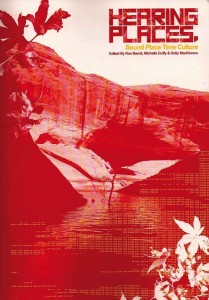The theoretical writing about sound comes in many forms and covers many different contexts. The role of sound in film, arts, media and everyday life has been analysed using a wide range of techniques and approaches.

Ros Bandt, Michelle Duffy and Dolly MacKinnon (eds), Hearing Places: Sound, Place, Time and Culture
One strength of this growing area is that it is generally sensitive to the specific properties of sound, avoiding the importing of extraneous theoretical models. This has meant that the scholarship on sound has largely avoided the theoretical dead-ends experienced by other branches of media theory, such as ‘cine-semiotics’ or ‘reading television’.
In previous decades, much writing on sound had a remedial aspect, arguing for an appreciation of the sonic in a Western culture thought to be primarily oriented to the visual; sound was considered the second sense in a culture in which ‘I see’ equals ‘I know’. Efforts were made by theorists of audiovisual culture to raise awareness of the importance of the aural in the perception of cultural products (the film theorist Michel Chion, for example, proposed that film viewing should be renamed audio-viewing). In recent years, however, as digital media has brought audio increasingly to the forefront of the information-sphere through such developments as podcasting and the ubiquitous mobile phone, scholars of sound are more concerned with mapping and understanding the diverse functions of audio in contemporary culture.
These four books – two monographs and two edited collections – continue that process admirably, if unevenly.
1. Ros Bandt, Michelle Duffy and Dolly MacKinnon (eds), Hearing Places: Sound, Place, Time and Culture, Cambridge Scholars Publishing, Newcastle, UK, 2007, 445pp, 36 track CD-ROM
2. David Bennett, Sounding Postmodernism: Sampling Australian Composers, Sound Artists and Music Critics, Australian Music Centre, Melbourne, 2008, 536pp.
3. Caleb Kelly, Cracked Media: The Sound of Malfunction, MIT Press, Cambridge, Massachusetts, 2009.
4. Frances Dyson, Sounding New Media: Immersion and Embodiment in the Arts and Culture, University of California Press, Berkeley, 2009.
John Potts
John Potts is Associate Professor in Media, Music and Cultural Studies, Macquarie University, Sydney. He is co-curator (with Rhonda Davis) of Horror, Come Darkness, Macquarie University Art Gallery, Sydney.
[For more, read the special Arts of Sound November 2009 Issue of Art Monthly Australia www.artmonthly.org.au]
 This work is licensed under a Creative Commons Attribution-NonCommercial-ShareAlike 2.5 Australia.
This work is licensed under a Creative Commons Attribution-NonCommercial-ShareAlike 2.5 Australia.






